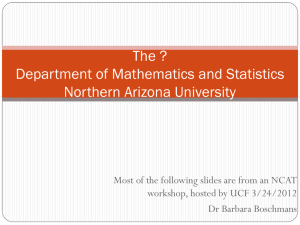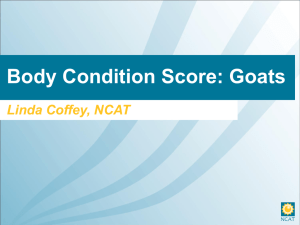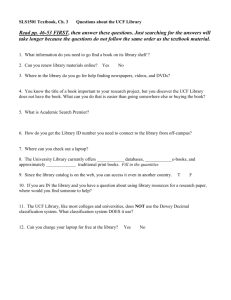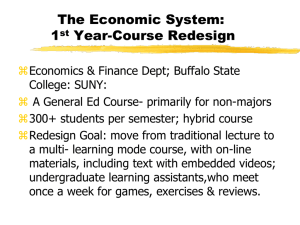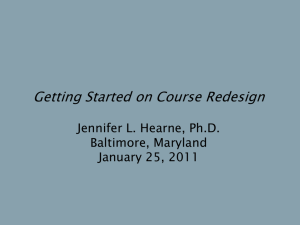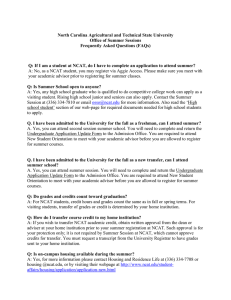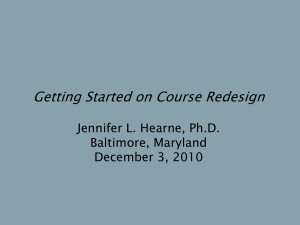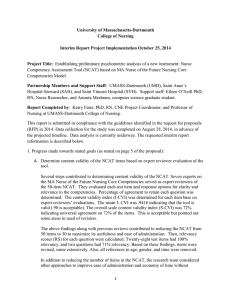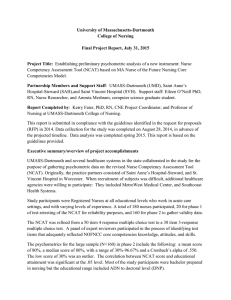Tammy Muhs, Ph.D. Assistant Chair, Mathematics Department
advertisement
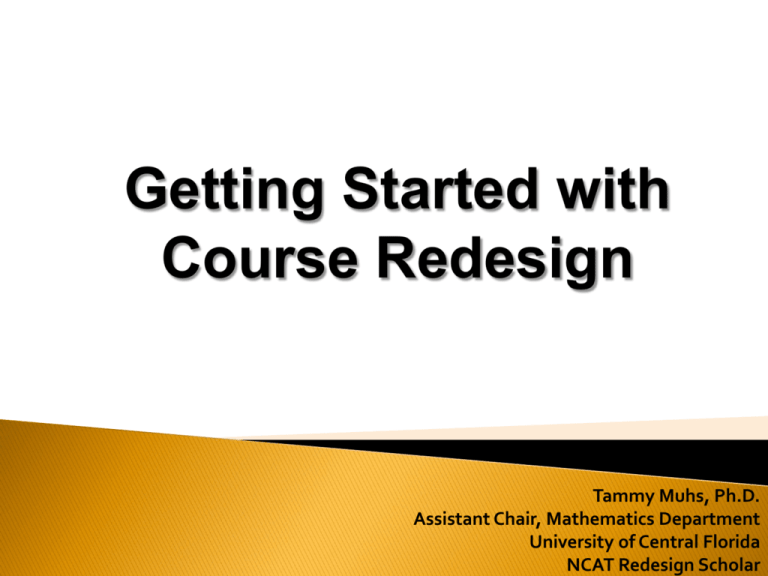
Getting Started with Course Redesign Tammy Muhs, Ph.D. Assistant Chair, Mathematics Department University of Central Florida NCAT Redesign Scholar IDENTIFY the problem(s) CHOOSE the learning technology, text, and method of delivery that best fit your goals BUILD an assessment plan WORK collaboratively START small Questions and Answers Why did we consider a mathematics course redesign? Increase learning outcomes and success rates while decreasing cost* and withdrawal rates Received the NCAT Grant in Spring 2008 Cost* - this goal was added as a requirement for the NCAT participation A) Current success rate of students B) Budget concerns C) Space concerns D) Administration request or requirement E) Creation of online or blended learning options F) Two or more of the above G) None of the above Emporium (Lab) Model*** Replacement (Hybrid) Model*** Supplemental Model Fully Online Model ***Typically produces the best results (student learning and cost) for Mathematics courses Students class spend one hour in ◦ review concepts from the previous week ◦ highlight upcoming material ◦ receive administration information Students spend a required three hours in the Mathematics Assistance and Learning Lab (MALL) • Online hw and quiz assignments are completed for the most part in the lab • Proctored environment • MALL staff provide on-demand assistance for students Testing is completed online in a proctored environment using a password system ◦ ◦ ◦ ◦ ◦ ◦ Immediate feedback Free response questions or multiple choice Challenge week ADA time accommodation adjustments Integrity violations almost non-existent Cost savings A) Emporium (Lab) Model B) Replacement (Hybrid) Model C) Supplemental Model D) Fully Online Model Current Trend nationwide Provides for immediate feedback ◦ Reduces grading Addresses the needs of our students ◦ Anytime, anywhere learning ◦ Flexibility ◦ Delivery system that they are accustomed to using How much do you believe the Help me solve this feature helped you learn College Algebra? (Fall 2011; n=1266) ◦ 92.1% of students replied with either very much or somewhat Will the technology and associated textbook be used in face-to-face classes? blended (hybrid) classes? a lab setting? completely online classes? Does my institution require use of a specific LMS? Integration concerns Provision of technical support? Technical support for students and faculty Progress monitoring? Does the technology support A) Yes B) No C) I don’t know We cannot state that students are learning unless we have evidence to support the claim. We do not know if or how to change our strategies unless we have analyzed the data from measures. We cannot develop our effectiveness as teachers unless we synthesize the results of multiple assessments to improve our performance. The purpose of Assessment is to provide a continuous process of planning measuring analyzing results using the results to make informed decisions ◦ preferably, this will lead to improvements Well defined learning goals Well defined learning objectives Two measures for each Consistency Identifying reasons for variability Creating a workable plan Sell the plan, keep everyone informed Faculty should be consulted on all decisions UCF team meets weekly to discuss content as well as plan curriculum and assessment UCF used the “coordinator” function of MyMathLab UCF is the 2nd largest in the country ◦ Fall 2013 enrollment 59,770 One of Florida’s eleven public universities Academic Programs: ◦ ◦ ◦ ◦ ◦ 91 Bachelor’s 86 Master’s 3 Specialist 30 Doctoral 1 Professional (Medicine) Our pilot was 941 students! Most successful redesigns have started with a pilot and continued until fully implemented Add additional technology as comfortable Some institutions start with homework and then add quizzes, tests, adaptive learning, multimedia, study plan, etc.
